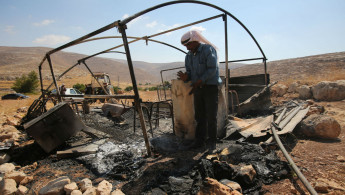Israel demolishes Palestinian homes leaving many homeless
Israel destroys more Palestinian Bedouin homes in the West Bank, as UN officials call for an immediate freeze on demolitions.
2 min read
More than 39 Bedouin homes and tents have been destroyed in the West Bank [AFP]
Israel has demolished more than 39 Palestinian Bedouin homes and tents in east of Jerusalem near the Ma'ale Adumim settlement.
Its actions have left nearly 400 Palestinians including 80 children homeless, reported Israeli newspaper Haaretz.
According to Haaretz, the demolished homes included 17 houses in the village of al-Fasayel.
B'Tselem, the Israeli Information Centre for Human Rights in the Occupied Territories, said that since 5 August Israel has demolished 31 residential buildings and 26 other buildings in different Palestinian clusters in the Jordan Valley and Ma'ale Adumim. This has made 167 people homeless, including 101 children.
The Israeli Civil Administration is trying to persuade the Bedouin of the Jahalin clan, which has lived near Ma'ale Adumim for decades, to move to the town of Naima, north of Jericho.
The Palestinians, however, have refused to move.
Haaretz also said one of the Knesset's settlements committee is demanding that all Bedouin communities in Zone C as designated by the 1995 Oslo II Accord, especially those near Ma'ale Adumim, are destroyed.
It is reportedly hoping to use the land to expand settlements, especially as some neighbourhoods of Ma'ale Adumim were built on land taken from the Jahalin after they were expelled from the area in the early 1990s.
Senior United Nations officials have also called for an immediate freeze on demolitions in the West Bank after 22 structures were demolished yesterday in four communities.
This has displaced 78 Palestinians, including 49 children, the vast majority of whom are Palestine refugees.
"Yesterday's demolitions targeted some of the most vulnerable communities in the West Bank," said Robert Piper, the Coordinator for Humanitarian and UN Development Activities for the Occupied Palestinian Territories.
"Many of these refugee families have now been displaced four times in the last four years," said Felipe Sanchez, director of the UN Relief and Works Agency for Palestine Refugees in the Near East Operations in the West Bank.
Its actions have left nearly 400 Palestinians including 80 children homeless, reported Israeli newspaper Haaretz.
According to Haaretz, the demolished homes included 17 houses in the village of al-Fasayel.
B'Tselem, the Israeli Information Centre for Human Rights in the Occupied Territories, said that since 5 August Israel has demolished 31 residential buildings and 26 other buildings in different Palestinian clusters in the Jordan Valley and Ma'ale Adumim. This has made 167 people homeless, including 101 children.
The Israeli Civil Administration is trying to persuade the Bedouin of the Jahalin clan, which has lived near Ma'ale Adumim for decades, to move to the town of Naima, north of Jericho.
The Palestinians, however, have refused to move.
Haaretz also said one of the Knesset's settlements committee is demanding that all Bedouin communities in Zone C as designated by the 1995 Oslo II Accord, especially those near Ma'ale Adumim, are destroyed.
It is reportedly hoping to use the land to expand settlements, especially as some neighbourhoods of Ma'ale Adumim were built on land taken from the Jahalin after they were expelled from the area in the early 1990s.
Senior United Nations officials have also called for an immediate freeze on demolitions in the West Bank after 22 structures were demolished yesterday in four communities.
This has displaced 78 Palestinians, including 49 children, the vast majority of whom are Palestine refugees.
"Yesterday's demolitions targeted some of the most vulnerable communities in the West Bank," said Robert Piper, the Coordinator for Humanitarian and UN Development Activities for the Occupied Palestinian Territories.
"Many of these refugee families have now been displaced four times in the last four years," said Felipe Sanchez, director of the UN Relief and Works Agency for Palestine Refugees in the Near East Operations in the West Bank.





 Follow the Middle East's top stories in English at The New Arab on Google News
Follow the Middle East's top stories in English at The New Arab on Google News


